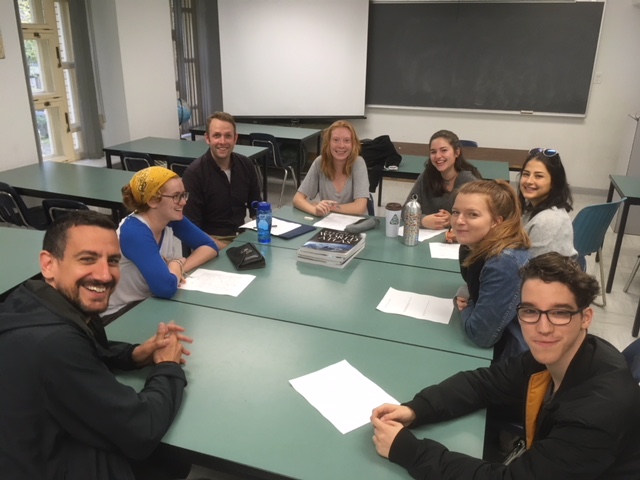Integrative Learning in Progress: Fall 2017 Learning Community Courses
Again this fall, the Learning Communities project is creating unique opportunities for interdisciplinary teaching and integrative learning. Of the twelve paired courses underway, the first three pairs below are running for the first time, after being developed in the second phase of the project in W17, while the remaining three pairs are repeat offerings of courses developed in phase I over the W16 term.
What’s been going on, both in and beyond the classrooms?
First Choice Science: Biology II & Organic Chemistry I, led by Janet Wyman (Biology) and Yoon Seo-Uh (Chemistry)
“The integrative assessment was a real highlight for our paired courses. Yoon introduced the students to stereo chemistry and the chirality of molecular structures, while Janet prepared them to understand the different biological impacts of enantiomer variations of the same molecule. In the lab, we challenged them with a case analysis authored by Janet, based on the story of a young woman who suffers the loss of her sense of smell due to a head trauma. The students responded enthusiastically and diligently, with great results; watch the video for more details. Now, we are moving into final exam preparation mode in our respective courses, but Yoon continues to attend Janet’s lectures, supporting the biology concepts with chemistry background where helpful. As Yoon says in the video, “Whenever we sit down to discuss an idea for the course, we are having a blast!” – Janet & Yoon

Counting the Costs: Social Justice in Canada? Canadian History & Quantitative Methods, led by Elizabeth Kirkland (History) and Ben Lander (History)


Nature Revisited: Nature Retreat PE Intensive & Literary Themes: Into the Wild, led by Doug Smyth (Physical Education) and Ian MacKenzie (English)
“Our weekend intensive at Lac Poisson Blanc in early October was a full-on integrative experience, for both students and teachers. Hiking, canoeing and rock-climbing skills provided the focus for the three days’ activities, while journal writing allowed students to reflect on what they’d learned in each activity, and to make connections to readings from their English class. The nature sculpture workshop was a highlight; working on an island in the middle of the lake, groups gathered materials from the shoreline and forest, then designed and created a sculpture that expressed their relationship to the natural world. Currently, as the end of term approaches in their English course, students are revising journal work and creative projects for publication on the “Into the Wild” course blog. We are already looking forward to our next version of this pairing for fall 2018 – and hoping for the same amazing weather!” – Doug and Ian





Mapping Shaughnessy Village: Introduction to Geography & Research Methods, led by Geoffrey Pearce (Geography) and Mark Beauchamp (History)


Imaging Violence and Non-violence: Humanities Worldviews & Complementary: Contemporary Issues, led by Pat Romano (Humanities) and Kim Simard (Cinema and Communications)

Reflections – War and Peace: 19th Century History & Humanities: Ethics, led by Michael Duckett (History) and Gray Miles (Humanities)
“This semester has again paired a Humanities Ethics course with a History course, and Tolstoy’s War and Peace is again at the centre of our discussions. We may see Humanities and History as different disciplines, but as students read and discuss Tolstoy’s novel, they are seeing these disciplines as very interrelated; for example, a character’s ethical decisions are frequently, even usually, made in a particular historical context. We as teachers try to find universal truths, but we learn reality from our students.” – Michael and Miles


So, what’s the Big Picture?
Building curricular bridges between traditionally separate disciplines entails a host of challenges, small and large. These challenges, and possibles responses, provided the topic for Randy Bass’s keynote address at Dawson’s Pedagogical Day in October.

Vice Provost for Education at Georgetown University, Dr. Bass argued that if colleges and universities hope to graduate students who are able to think and problem solve in integrative and interdisciplinary ways, they will need to create more flexible curricular structures, and support new approaches to instruction that confront students with complex, unscripted problems and situations.
These concerns are at the heart of the design and delivery of this fall’s Learning Communities courses, and will remain central to the next phase of course development in Winter 2018, when a third and final phase of the project’s ECQ grant will (hopefully!) fund a new team of 5-6 teachers working on 2-3 new course pairings.
Questions about any of the F17 courses or the LC project? Don’t hesitate to get in touch.




